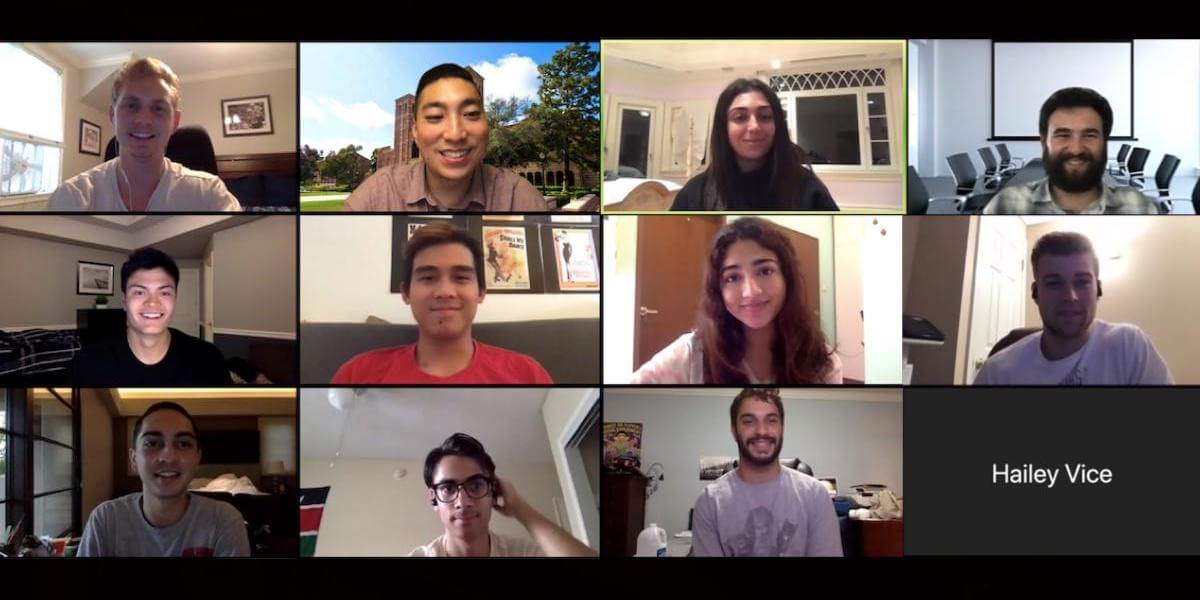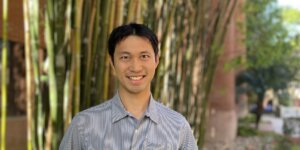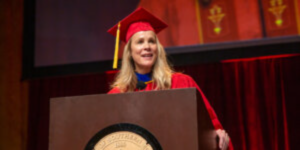
The 12 student founders of SC Dao from Chung’s ITP-496 class continued to meet over Zoom when the semester went remote. Image Courtesy of Benji Miller
This semester, USC students launched Student Capital DAO, a revolutionary new initiative that will provide grants to student founders with the mission of fostering and supporting entrepreneurship on campus.
One of the first student-led funds of its kind, Student Capital DAO, or SC DAO, was created by 12 ITP 496 students under the direction of Eric Chung, a part-time lecturer of information technology at the USC Viterbi School of Engineering.
DAOs are organizations that function following protocols and rules that are coded into a computer program without needing any central form of management. Instead of central leadership, all shareholders understand and control the protocols of the organization. SC DAO will function by providing student founders with milestone dependent micro-grants, meaning projects will receive a small cash grant each time they achieve a mutually agreed upon milestone, like number of customers or number of products sold.
“Our thesis is that by frequently granting small amounts of capital into USC’s student founders without expectation of financial return, we drastically lower the barriers to entry for a wide range of students wanting to embark on the journey of entrepreneurship,” Chung said. The overall goal of SC DAO is to increase student entrepreneurship by giving more students the opportunity to pursue projects and ideas without the pressure of the obligation to pay back any of the funds.
Students enrolled in Chung’s ITP 496, “The Start-up Launchpad Lab,” developed the idea for the DAO after Chung pitched it to them at the beginning of the semester. In Chung’s course, students work together throughout the semester to brainstorm, design, and eventually implement an idea for a start-up company. This is Chung’s first semester teaching the course at USC. SC DAO will provide funding for promising student projects that could include developing new products, new apps, and new technologies.
A few projects have already submitted applications, and since the fund accepts proposals on a rolling basis, there is no deadline to apply.
“We hope to give students the opportunity to receive funding for a project at any time,” said Benji Miller, a senior majoring in business and minoring in tech entrepreneurship and a student in Chung’s ITP 496, who co-founded SC DAO.
The SC DAO student founders currently fund the grants, although they hope to secure support for donors, especially from USC alumni. This semester, the fund raised around $900 in total, but students are hopeful that this amount will only increase in future semesters as more donors become aware of the initiative. The current funding range per project is $50 to $250, which is broken down into around $50-100 per milestone. Although SC DAO is only a few months old, they have already distributed around $400 of their funds to a few different projects this semester.
SC DAO is the first student-led fund structured as a blockchain-powered “decentralized autonomous organization” in the world, according to Chung.
DAOs use blockchain technology as a way disseminating finances efficiently and securely. The use of blockchain technology in the case of SC DAO makes the distribution of funds to student projects run smoothly and means they can be distributed efficiently, securely, and quickly after decisions are made. SC DAO receives no sort of ownership percentage for investing in companies – it exists simply to provide an opportunity for student entrepreneurs to pursue ideas without asking for anything in return.
SC DAO is not the first organization to offer funding and grants to student entrepreneurs, but it is the first to do so using its milestone dependent DAO approach, according to Miller.
Traditionally, organizations providing support to student entrepreneurs will invite them to compete against other start-ups for a grant. The decision of how much funding a proposal will receive is largely based on how well the idea is pitched. SC DAO, on the other hand, can distribute funding based instead on how well the project actually performs because they don’t distribute the grant all at once. Instead, they give just enough to support students in achieving specific goals and then provide more funding over time as projects reach these milestones.
“Let’s say we find a project we are willing to give $1,000,” explained Miller. “Instead of giving all of the money at once, our next step is to break down each project into milestones. For example, one milestone could be achieving 50 customers in the first month. We might give them $100 to start, and if they reach that milestone of 50 customers, we’ll provide a next bit of funding, along with another milestone, and so on.”
Instead of rewarding a successful pitch, SC DAO rewards successful execution.
The fund works by accepting applications from student entrepreneurs through a form available on its website. The application is then sent to all members of the DAO, which currently just consists of the 12 ITP 496 students. Each member votes on a given idea. Student entrepreneurs who receive majority vote will then be invited to an interview. After the in-person chat, members of the DAO meet to discuss and decide upon whether to accept the grant proposal.
“USC has an impeccable entrepreneurship program, but we felt that entrepreneurship can’t be fully taught in a class, it has to be experienced first-hand,” said Kieran Jha, a senior at USC majoring in economics with a minor in digital entrepreneurship who was part of the group of ITP-496 students who founded the DAO. “SC DAO adds a new dimension to students’ education as entrepreneurs because it allows them to take the leap and actually start their own company without the financial burden associated with it.”
The ultimate goal of SC DAO’s student founders is for their initiative to expand to other universities. “To me, building SC DAO with the intention of expanding it to universities nation-wide was important because I think it’s really important for university students around the country to have access to the means to make their ideas a reality,” Miller said
Said Professor Chung: “SC DAO embodies an idea that has never been done before on a university campus, and we’re excited to blaze the trail for alternative funding structures that empowers student founders.”
“The majority of SC DAO members are seniors, but we hope that SC DAO will continue to grow with new students taking over, so in the future, we can keep working to hopefully change the landscape of USC entrepreneurship forever,” Jha said.
Students interested in becoming a part of the SC DAO board can contact Chung for more information.
Published on May 22nd, 2020
Last updated on May 16th, 2024













